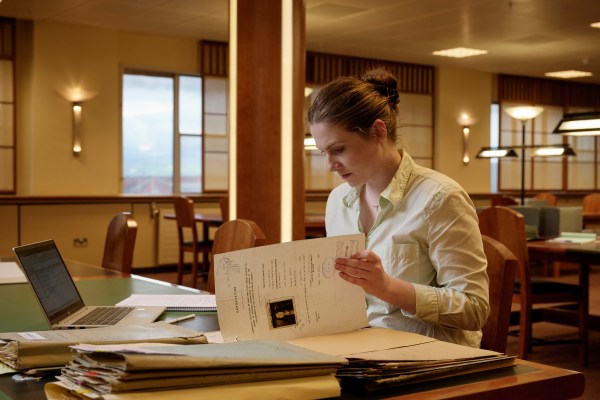Conas rochtain a fháil ar an Seomra Léitheoireachta
Is féidir le haon duine den phobal rochtain a fháil ar Sheomra Léitheoireachta na Cartlainne Náisiúnta. Ní mór duit a bheith 16 bliana d’aois nó níos sine, ticéad léitheoirí bailí a bheith agat agus an leabhar tinrimh a shíniú gach lá.
Iarratas a dhéanamh ar thicéad léitheora
Inrochtaineacht
Má tá riachtanais inrochtaineachta nó riachtanais bhreise agat, déan teagmháil lenár nOifigigh Rochtana roimh do chuairt, le do thoil.
Áiseanna do thaighdeoirí
- Taisceadáin saor in aisce le haghaidh do chuid giuirléidí pearsanta
- Wi-Fi saor in aisce
- Tá pointí cumhachta ag gach bord
- Tá fuaraitheoirí uisce i bhforhalla an tSeomra Léitheoireachta agus i seomra na dtaisceadán
- Tá roinnt ríomhairí pearsanta ar fáil do thaighdeoirí
Áiseanna aimsithe
Is catalóg a scríobh cartlannaithe í an áis aimsithe chun cabhrú le taighdeoirí a fháil amach cad iad na taifid atá i mbailiúchán. Is féidir áiseanna aimsithe le haghaidh ábhar nua a chuardach sa chatalóg chlóite agus ar líne. B’fhéidir nach mbeadh ábhar níos sine ar líne agus ní mór é a chuardach in áiseanna aimsithe fisiciúla nó in innéacsanna cártaí sa Seomra Léitheoireachta.
Agus na catalóga agus na háiseanna aimsithe á n-úsáid agat:
-
Ná scríobh orthu ná ná marcáil iad -
Bain úsáid as na cúisíní atá ar fáil chun tacú leis na dromlaigh -
Cuir ar ais ar na seilfeanna iad nuair a bheidh tú críochnaithe
Léitheoirí micreascannáin agus micrifíse
Tá léitheoirí traidisiúnta micreascannán, léitheoir micrifíseanna, printéirí micreascannán agus scanóirí ar fáil sa Seomra Léitheoireachta. Éascaíonn siad sin rochtain ar ábhar cartlainne nach bhfuil ar fáil ach ar mhicreascannán. Má tá ceisteanna agat faoi na háiseanna aimsithe nó faoi na léitheoirí micreascannán, cuir ceist le do thoil ar an gCartlannaí atá ar Dualgas.
Bailiúcháin ar mhicreascannáin
Rialacha do Léitheoirí
Ní mór do gach cuairteoir chuig an gCartlann Náisiúnta na rialacha do léitheoirí a shíniú agus iad ag déanamh iarratas ar thicéad léitheora. Cinntíonn na rialacha seo timpeallacht oibre chompordach do gach taighdeoir agus cinntíonn sé caomhnú na ndoiciméad bunaidh.
Na nithe a cheadaítear a thabhairt leat
Ní cheadaítear nithe a d’fhéadfadh dochar a dhéanamh don chartlann a thabhairt isteach sa Seomra Léitheoireachta.
| Ceadaítear | Ní cheadaítear |
|
|
Agus tú sa Seomra Léitheoireachta, ba chóir
Fanacht i do thost ach amháin má tá tú ag labhairt le ball foirne. Caitheamh le léitheoirí eile le cúirtéis agus le meas.
Taifid a ordú
Stóráiltear formhór ár dtaifead ar an láthair agus is féidir iad a ordú lá do chuairte ar an Seomra Léitheoireachta. Is féidir cartlanna atá stóráilte lasmuigh den láthair a ordú roimh do chuairt.
Agus tú ag plé le hábhar cartlainne
Tá ábhar cartlainne leochaileach agus ní mór caitheamh leis le meas.
Conas cartlanna a láimhseáil
Taifid a thabhairt ar ais agus iad a choinneáil
Tar éis duit na taifid a úsáid, tabhair ar ais chuig an deasc um Thuairisceáin iad, áit a logálfar gach doiciméad nuair a bheidh siad á dtabhairt ar ais. Más gá duit doiciméid ar laethanta breise, is féidir leat iarratas a dhéanamh go gcuirfí ar ais iad. Comhlánaigh an fhoirm riachtanach, agus cuirfear na míreanna in áirithe duit go dtí an dáta sonraithe. Tar éis an dáta sin, cuirfear na míreanna ar ais chuig an stór.
Grianghrafadóireacht dhigiteach
- Is féidir íomhánna digiteacha a ghlacadh le haghaidh taighde príobháideach
- Ní mór duit foirm cheada a shíniú roimh ré
- Is gá mód eitleáin a chur ar siúl ar fhóin
Taifid rúnda
B’fhéidir go mbeidh ort Foirm um Chosaint Sonraí a shíniú má tá tú ag féachaint ar fhaisnéis phearsanta. Téigh i dteagmháil leis an gCartlannaí ar Dualgais.
Cóipcheart
D’fhéadfadh ábhar cartlainne a bheith faoi réir cóipchirt. Beidh ort iarratas a dhéanamh ar chead más mian leat aon ábhar cartlainne a fhoilsiú nó a atáirgeadh.
Léigh na treoirlínte cóipchirt
Cabhair a fháil
Is féidir le foireann an tSeomra Léitheoireachta cabhrú leat le ceisteanna taighde ginearálta. Is féidir leo:
- Rochtain ar áiseanna aimsithe a sholáthar
- Cabhrú leis na huimhreacha tagartha cearta a aimsiú
- Cúnamh a chur ar fáil maidir le léitheoirí micreascannán agus ríomhairí poiblí a úsáid
- Comhairle a thabhairt maidir le seirbhísí cóipeála agus táillí gaolmhara
Is féidir leis an gCartlannaí ar Dualgas:
- Cabhrú leat rochtain a fháil ar thaifid
- Ceisteanna a bhaineann le taighde a fhreagairt
- Cabhrú le fiosruithe sonracha cartlainne
Roimh do chuairt, féach ar na nithe seo a leanas le do thoil:
